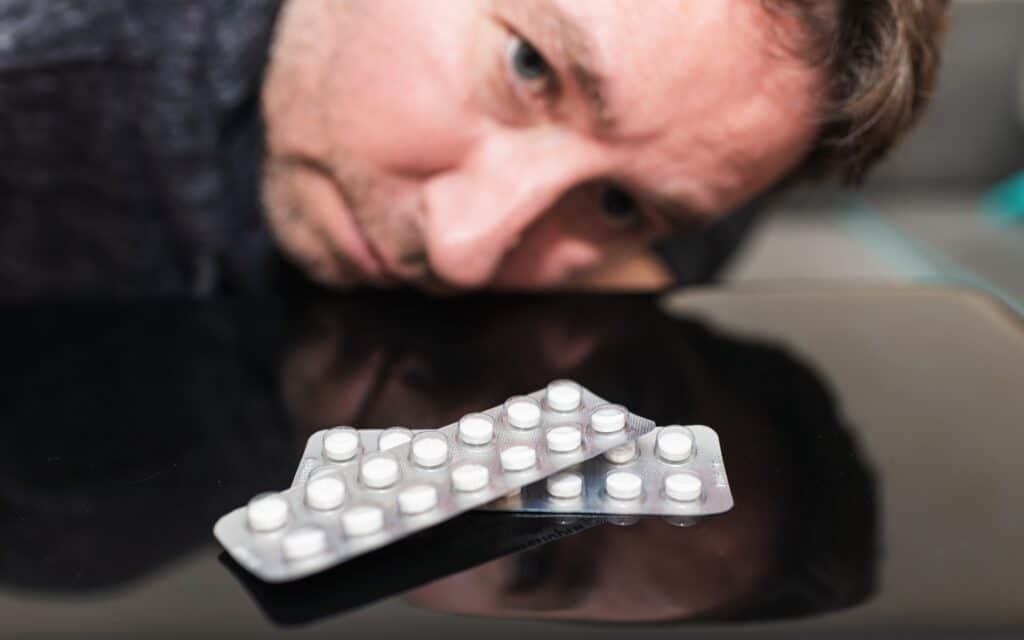The question “Is Zopiclone addictive?” is a common one among insomniacs. While sleep medication can be a good short-term solution for various sleep issues, sleeping pill addiction is one of the primary reasons why long-term use is not recommended. Our post today explores how addictive sleeping pills are. Carry on reading to get wiser.
As prescriptions for sleeping pills continue to increase at an incredible rate, in a world full of stressed, and anxious insomniacs, fears about addiction are growing.
According to the Economic and Social Research Council, 1 in 10 of us are now reliant on some kind of sleeping pill. While many medications can result in addiction, some substances are definitely more habit-forming than others.
Used correctly, Zopiclone can be an effective treatment for short-term insomnia, but it’s far from the safest solution. Otherwise known as Imovane, Zopiclone is a form of sleeping pill frequently associated with addiction and substance abuse.
Here’s what you need to know about how addictive Zopiclone is, Zopiclone withdrawal and sleeping pill addiction.
How does Zopiclone work? When is Zopiclone addictive?
Zopiclone is a short-term medication commonly prescribed for insomnia and other sleep disorders. Closely related to benzodiazepine medications like diazepam, Zopiclone can effectively hasten sleep onset. It induces relaxation, ideal for those who have trouble sleeping. Unfortunately, it’s also highly addictive.
It is possible to take Zopiclone for a short period of time (two weeks or less) without forming an addiction. However, coming off Zopiclone can be very difficult for some.
The habit-forming nature of Zopiclone means it is no longer available in the US. It has been discovered in the black market in the past. Zopiclone is considered more dangerous than other sleeping pills for additional reasons.
In certain cases, this substance can place people into a very deep and dangerous sleep, when combined with alcohol. In other cases people experience severe rebound effects after 3-4 nights of starting Zopiclone.
Because Zopiclone influences the same part of the brain as alcohol and benzodiazepines, it can create a sense of euphoria for some people. Hence, it can be hard to give up. This especially when used longer than a few weeks.
The relaxing and sedating effects of Zopiclone begin to diminish very quickly in some users. This often leads people to believe they need more of it, and for longer periods of time. In desperation many people start seeking out higher doses of the medication. Hence, it is easy to develop a tolerance to this drug.
A person can become dependent on Zopiclone to the point where their body becomes used to functioning with the support of the drug. If you attempt to reduce or stop your use during this stage of consumption, it may lead to Zopiclone withdrawal symptoms.

Is it OK to take Zopiclone every night? Signs of Zopiclone addiction
If you’re taking Zopiclone regularly, or on a long-term basis, you will be at higher risk of a possible addiction. It’s important not to continue taking this medication for any longer than recommended by your healthcare provider. To be on the safe side, try not to use it continually for more than 3-4 nights.
Knowing how to spot the signs of Zopiclone addiction can be crucial to ensuring you get the right help and support with this medication. If you notice the following issues, seek doctor assistance:
Taking a higher dose of Zopiclone than prescribed by your doctor
It’s possible to become resistant to Zopiclone over time, which may cause you to seek out higher doses to achieve the same sedative effects.
Buying additional Zopiclone tablets outside of prescription
Seeking out extra doses of medication, either by stealing someone else’s prescription, or purchasing medication via street dealers could indicate dangerous addictive behavior.
Using Zopiclone with other substances
Zopiclone is generally more dangerous when combined with other substances like drugs and alcohol. Taking these substances in conjunction with your medication indicates dangerous, impulsive behavior.
Using Zopiclone despite negative health effects
You should not continue to use any medication if you notice a negative impact on your mental or physical health.
Struggling to stop using Zopiclone
If you find it difficult to stop using Zopiclone, despite trying to do so, or you experience withdrawal systems when not taking it, this could be a sign of addiction.
If you find yourself engaging in unusual behavior, like hiding Zopiclone tablets from others, or using the substance incorrectly (crushing, or attempting to inject), this is a clear sign of a problem. Emotional issues, like being unable to connect with others, and withdrawing from your social circle may also occur in some cases.
Zopiclone withdrawal symptoms
If you follow the instructions provided by your doctor carefully and do not take Zopiclone for longer than intended, your risk of Zopiclone withdrawal will be lower. However, anyone may find themselves suffering from withdrawal after taking a habit-forming drug.
If you are forming an addiction to Zopiclone, you may not recognize the extent of the problem until you attempt coming off Zopiclone, and experience the associated side effects.
Remember, Zopiclone withdrawal is more likely for people who take the substance regularly for an extended period of time, or at a higher than usual dose. Some of the most common Zopiclone withdrawal symptoms include:
- Anxiety or feelings of panic
- Tremors and shakes
- Hot flushes and sweating
- Insomnia (trouble sleeping)
- Heart palpitations
- Racing heart
- Confusion
- Paranoia
- Feelings of depression
- Abnormal sensory perception
- Feelings of association
- Muscle aches and spasms
- Flu-like symptoms
- Irritability or anger
In very rare circumstances, someone addicted to Zopiclone who stops taking the drug may experience severe symptoms like seizures. If you are dealing with addiction and you’re worried about coming off Zopiclone, it’s often best to seek out medical assistance.

Why is coming off Zopiclone so difficult?
Zopiclone is a specific kind of drug, which works by increasing the activity of a specific neurotransmitter in the brain (GABA). This is a form of inhibitory transmitter, which slows the firing of other neurotransmitters, reducing the overall activity levels of your brain.
GABA suppresses various other neurotransmitters, like serotonin, dopamine, epinephrine, and acetylcholine. These transmitters pay crucial roles in muscle movement, emotional regulation, memory, heart rate, and blood pressure.
When taking Zopiclone, you change a range of the body’s essential functions, making them feel far more severe when Zopiclone is no longer available.
A person with any form of addiction will always find it difficult to stop on their own. However, when a medication like Zopiclone has such a significant impact on your perception of “normal” feelings for your body, it can feel extremely worrying, when something changes.
It’s advised, if you’re recovering from a Zopiclone addiction, you should do so in a medically assisted environment. Your withdrawal should be monitored, and you remain as safe and comfortable as possible.
If your withdrawal symptoms aren’t too severe, or you haven’t been on Zopiclone for a long period of time, your doctor will often recommend tapering off slowly. In these cases you’ll be encouraged to do “urge surfing“.
How to come off Zopiclone after longer use
Coming off Zopiclone is something that should be done with care and caution, due to the severity of Zopiclone withdrawal. Your doctor will recommend reducing your dosage of Zopiclone gradually, rather than stopping consumption of these drugs altogether.
Consult your doctor or pharmacist for advice on the rate at which you should reduce your dosage. You might be able to get extra help with things like pill splitters to lower your dose, and talk therapy to manage the side effects of withdrawal. If you are concerned you have an addiction, you will need to seek out specific professional counselling.
Keeping a written record of your process coming off Zopiclone can help you to keep track of any symptoms you should be aware of. You can also measure your progress this way. To deal with withdrawal symptoms, speak to your doctor. Common solutions include:
Digestion remedies
Dietary changes and indigestion remedies can be helpful for dealing with stomach and bowel problems, which occur during Zopiclone withdrawal.
Therapy
Counselling, group sessions, and other forms of therapy can help with the anxiety and panic attacks which may occur when coming off Zopiclone. You should also seek therapy to assist with addictive behaviours, so you can avoid them in future.
Pain relief
Your doctor may advise various forms of pain relief to deal with muscle aches and pains which emerge after taking Zopiclone for extended periods of time.
Sleep hygiene
Rather than suggesting another form of sleeping medication, most doctors will advise exploring natural solutions to insomnia and sleeping problems. You may also be asked to keep a dream journal to help with future insomnia treatments.
Coping methods
A medical professional will work with you to find coping methods for dealing with withdrawal symptoms unique to your condition, like sinus problems, hot flushes, and even nightmares.
Can Zopiclone be taken long term?
The short answer is no. Zopiclone can be an extremely addictive substance, and it’s one of the most common medications associated with sleeping pill addiction. If your doctor considers your situation and decides to offer zopiclone for a brief issue of insomnia, it should only ever be taken short-term. If, for any reason, you end up taking Zopiclone for too long, or form a habit, it’s important to seek help.
Zopiclone addiction and withdrawal symptoms can be managed with the right planning and support from medical professionals.
Siestio. Sleep Matters.
Medical disclaimer
You must not rely on the information provided on our website as an alternative to medical advice from your doctor or other healthcare professionals. For more information read our full disclaimer here.







